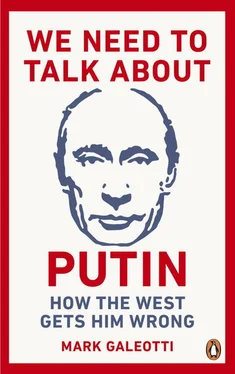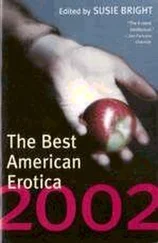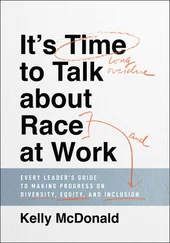However, Putin was tremendously lucky in his first two terms. With the West distracted by the ‘Global War on Terror’ and oil and gas prices high, he had free rein at home. He had enough money to ensure that ordinary Russians could enjoy a better quality of life than ever before, as well as to pour into the military and buy off the elite by turning a blind eye to their own self-enrichment. Life got better, the streets became safer and the fear of collapse and fragmentation receded. Of course, at the same time he set up his sock-puppet opposition parties, reasserted state control of television and suppressed any viable alternatives, but the irony is that he could probably have held free and fair elections and still won.
Won rather than triumphed, though, and he clearly wanted overwhelming statements of support to silence any doubting voices, a coronation more than a mere victory, so from the first Putin’s democracy was so-called ‘managed democracy’. Besides, you can only campaign on not being Boris Yeltsin and this not being the terrible 1990s for so long. Worse yet, over time, international hydrocarbon prices would wobble and the corruption at the heart of the system ensured that it was the masses rather than the masters who paid the price. Despite the temporary patriotic boost provided by the annexation of Crimea, Putin has increasingly had to rely on propaganda and coercion to retain his grip.
Many Russians still revere Putin for making them feel that their country matters in the world again. A diminishing number of others still feel grateful to him for the good times of the 2000s. The feelings of many others, though, seem to represent a country-wide case of Stockholm syndrome, the perverse sympathy that kidnap victims can feel for their captors. This does not mean they will always back him, especially if they come to believe that he cannot offer them and their children the kind of lives they expect. Consider what happened in Britain in 1945. Winston Churchill was widely regarded with colossal respect and enthusiasm by the British people, as the architect of survival and victory through the harrowing years of the Second World War. Yet they still voted him out of office, being able to balance respect for Churchill as a person with a sense that he and above all his Conservative Party did not offer the future they wanted. While the prospect of Putin leaving office because he loses an election is so minuscule as to be near-invisible, we must still remember that the Russian people are no less capable of political nuance.
In 2017, the Levada Center polled Russians about reform in their country. There were massive differences in opinion about what kind they wanted, how quickly it should come, and how far it should go, and the Kremlin is able to capitalise on this lack of any consensus. But at the same time it must also be deeply concerned, as while 42 per cent wanted dramatic reform and 41 per cent preferred incremental change, only 11 per cent wanted to retain the status quo. So 60–80 per cent approve Putin-the-man, but even most of his supporters want to see Putinism-the-system reformed or done away with altogether. They can respect Putin, without endorsing all or even most of his policies; they can want to see statues raised in his name, but someone else in his office.
This duality is what scares Putin and his cronies: it is the reason they feel they cannot afford to let Navalny on prime-time television and it is why they have all those armed National Guard officers deployed across the country. We may still be beguiled by his sky-high approval ratings, but the Kremlin is less easily fooled.
Chapter 8: Putin Is Loyal to His Own
On a cold night in November 2016, Alexei Ulyukayev, the minister for economic development, was paying a visit to Igor Sechin, head of the massive Rosneft oil company. Ulyukayev had publicly opposed Rosneft’s takeover of their rival Bashneft, but the dispute appeared to have been ironed out, and the meeting was an opportunity to bury the hatchet. Unfortunately for Ulyukaev, he didn’t know where Sechin was planning on burying it. According to his own account, after an amicable chat, Sechin gave him a bag. Then, as Ulyukayev left the Rosneft offices, he was confronted by FSB officers who arrested him; it turned out that the bag contained cash, lots of it.
Sechin claimed that the minister had demanded $2 million to approve the Bashneft takeover, while Ulyukayev claimed that he had been framed, and that he had thought the bag contained a relatively trivial thank-you gift, whether sausages (Sechin, a keen hunter, is known for gifting products made from his kills) or fine wine. The truth of the matter is hard to ascertain. Russian business culture does extend to such gifting, which can often mean cash, too – ministers and other high-status officials certainly live lifestyles that are vastly more lavish than their relatively moderate salaries would allow.
On the other hand, Sechin is one of the most fearsome beasts in Moscow, a man whose thuggish looks accurately reflect his raw-knuckled business tactics. He also has a formidable krysha – ‘roof’, the worryingly common Russian term for protection – having been Putin’s former aide, bagman and general strong right hand, back in his days at the St Petersburg mayor’s office. He is hardly the kind of person you’d think a bespectacled economic liberal would try to shake down for a bribe, and the prosecution never bothered to make a strong case. Sechin had worn a wire, but his conversation with Ulyukayev was ambiguous, and he also repeatedly failed to show up to be cross-examined in court. Much of the case relied on the testimony of Oleg Feoktistov, a former FSB officer and old friend of Sechin’s, whom he had just hired to be his security chief.
Many people, seemingly including Ulyukayev, thought Putin would step in to save him. After all, this was a shocking and controversial case, especially for the Russian elite: Sechin seemed to be using his connections in the security apparatus to prosecute a personal feud and to demonstrate that he was not to be messed with, while Ulyukayev had been doing nothing that any of the rest hadn’t. The business elite were worried that Sechin was getting too powerful, too dangerous; the administrative elite were alarmed that they could be the targets of such vendettas; investors were spooked. Common sense would suggest that Putin step in to signal a reprieve for Ulyukayev and a reproof for Sechin.
Instead, Ulyukayev was found guilty and fined 130 million rubles (£1.6 million). The sixty-one-year-old was sentenced to eight years in a tough-regime prison colony for bribery, making him the first minister sent to prison for over sixty years.
The case was flimsy, the political and economic calculus definitely in Ulyukayev’s favour, but when it came down to it, he was just a minister, with no backstory with Putin, while Sechin was one of the president’s guys. He was Putin’s aide back in St Petersburg, the man who met him whenever he returned from a business trip, the man who carried his bags and prepared his briefings, the man who sharpened his pencils, and also the man who kept tabs on who owed what and who was asking for which favours. The man who knew where the bodies are buried (possibly literally). With his own underlings, the ruthless, workaholic Sechin is a notorious terror; with the boss, he is the model of discretion and loyalty.
Putin has a very personal approach to politics, and the real currency in Russia at the top level is not the ruble, nor even the dollar or the euro, but access to, and a relationship with, the boss. Putin is considered ruthless, and he certainly is to those he does not know. After they had half achieved independence under Yeltsin, the Chechens were subjugated by a vicious military campaign during Putin’s first term in office; up to a quarter of a million people may have died. The Ukrainians are suffering now because of his refusal to accept that their country has the right to determine its own fate, or even that it is a proper country at all. And ordinary Russians are seeing their pensions raided and their quality of life eroded to pay for his adventures abroad and the embezzlement by the elite.
Читать дальше












